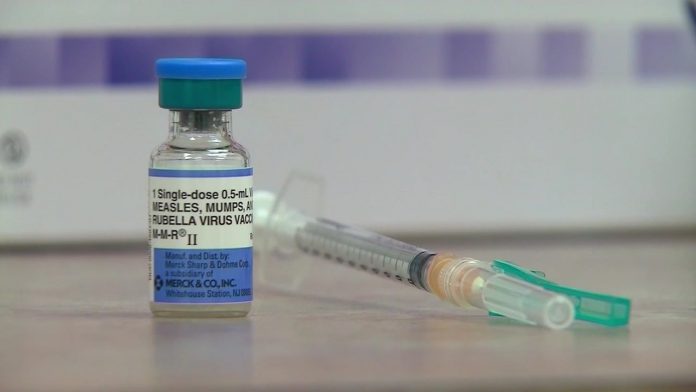The measles, mumps and rubella vaccine does not cause autism, according to a major study carried out in an attempt to reassure growing numbers of vaccination-doubters, as measles outbreaks surge.
Doubts about MMR were sown by the gastroenterologist Andrew Wakefield, who hypothesised in 1998 that it was linked to autism. The symptoms of the condition often begin to manifest at about the time the jab is given, between 12 and 15 months old.
The theory has been discredited and Wakefield was later disbarred from practising medicine, but there has been an upsurge in doubt about the safety of vaccines, spread on social media and in some countries also linked to anti-establishment populism.
On Friday, Unicef warned measles cases had risen to shocking levels around the world, spreading among unvaccinated children. The World Health Organization has said vaccine hesitancy is one of the 10 biggest global threats to health.
The paper in the journal Annals of Internal Medicine, which is published by the American College of Physicians, was written by Danish researchers, who also conducted one of the key studies to disprove the link in 2002. Their latest work involves 6,517 cases of autism, the biggest number to date, among 650,000 children on the Danish population registry, followed over 10 years.
Dr Anders Peter Hviid from the Statens Serum Institut in Copenhagen said: “That [2002 study] was published in the New England Journal of Medicine 16 years ago, but it hasn’t dispelled this idea that vaccination causes autism.
“I remember a couple of years ago we even saw Donald Trump in his presidential campaign tweet about vaccines causing autism.”
Researchers aimed to specifically address some of the criticisms of the anti-vaccination lobby, such as the suggestion that some groups of children were more vulnerable to autism following MMR vaccination than others. The researchers looked at children with a sibling who has autism and those with increased risk factors for autism, such as older parents.
They also looked at whether there was more autism among children who had received other vaccinations before MMR. Anti-MMR campaigners have also made claims of “clusters” of a regressive form of autism, caused by vaccination, which do not show up in whole population studies.
All these theories were tested in the study, said Hviid, and found to be false.
“We found no support for the hypothesis of increased risk for autism after MMR vaccination in a nationwide unselected population of Danish children, no support for the hypothesis of MMR vaccination triggering autism in susceptible subgroups characterised by environmental and familial risk factors, and no support for a clustering of autism cases in specific time periods after MMR vaccination,” the paper said.
In the study’s editorial, Saad Omer from the Rollins School of Public Health at Emory University in Atlanta, Georgia, and Inci Yildirim from Emory University’s School of Medicine said the study was worth carrying out, even though it had already been shown there was no link between MMR and autism.
“In an ideal world, vaccine safety research would be conducted only to evaluate scientifically grounded hypotheses, not in response to the conspiracy du jour. In reality, hypotheses propagated by vaccine sceptics can affect public confidence in vaccines,” they wrote.
The study may not be enough, they admitted: “It has been said that we now live in a ‘fact-resistant’ world where data have limited persuasive value. So how do physicians and public health officials debunk the MMR–autism myth?”
Omer and Yildirim offered three suggestions. First, any vaccine myth should be clearly labelled as such, they said, calling for headlines on stories not to suggest links that are then dispelled in the text. Second, when correcting incorrect information, scientists should focus on the key facts and not try to answer everything. Third, “an alternative explanation of the perceived phenomenon should be provided”. Otherwise, they added, the chances were the doubter would go back to their previous beliefs.













